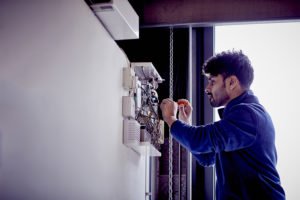There is a growing awareness of the need for more installers, engineers and integrators in the fire and security sector. While many come from the traditional apprenticeship route, Dakota Murphey explores why businesses should be ready to accept those from other industries and how they can do so – particularly where they have crossover technical skills.

As time goes by most people recognise the things that make them happy and, knowing how much time we spend at work, lots come to the conclusion that they want to enjoy their job. It’s not always possible but some people decide to take the leap of faith and reskill.
As the pandemic gave people more of an incentive to spend their time doing what they enjoy, ‘career changing’ has enjoyed something of a boom in recent years. In fact, a 2021 survey by Aviva discovered 60% of people planned to switch careers. People are more motivated to seek out new jobs and find a more rewarding work/life balance.
As such, security, installation and integration companies may find themselves primed for career changers due to the transferrable skills involved across these sectors. Such industries have had to adapt to new ways of working and are attracting career changers since witnessing a pronounced shift in how their roles are perceived, as Chris Middleton, Security Director, at ABM UK said, “COVID … allowed us to come to the fore and demonstrate the value we bring as an industry. Perhaps for the first time those working in security are now considered key workers”.
The decision to switch careers, however, doesn’t come lightly as people are likely giving up a well-paid job for something unknown, uncertain and which often means starting from the bottom again. But, with the average age of 39, those who do change careers to follow their passion or skills often find it rewarding.
You may even find yourself hiring a career changer in the not so distant future, so, how can you seamlessly welcome them into your team?
Give them time to settle
Any new starter is given time to settle and typically their probation period would be a good timeline to gauge whether they are cut out for the role or not. You may find a career changer can take a little longer to settle due to the possibility of second-guessing themselves when a few things don’t go their way.
In these times they may question whether they have made the right decision or not. It’s important to be positive to help prevent them from getting too much in their heads. Everyone has a bad day from time to time. Helping career chargers to get through theirs will see them stick to their tasks and reap the benefits of finding a career that suits them.
Offering support is key
While you haven’t hired a career changer to become a surrogate parent to them, they can need additional support. It is sometimes tough on someone coming into a new job in a relatively junior position when they may have been at a mid-level previously.
Obviously, they decided to try something new but that doesn’t mean it should be made difficult for them.
Given their previous level of seniority or sometimes their age, a career changer may be hesitant in asking questions; although they are sure to have plenty. Supporting them through effective management and giving them a buddy or mentor for their early days will help them to settle and find their feet. Having someone who is a peer rather than a manager to bounce ideas off can help a career changer feel like part of the team right away.

 But as Jamie explains: “The security and fire safety industry is fast evolving, and we need to stay ahead of the game when it comes to understanding smart systems and mobile-first technology. To do this, we must have the right team with up-to-date skill sets to stay inspired on our journey to success.
But as Jamie explains: “The security and fire safety industry is fast evolving, and we need to stay ahead of the game when it comes to understanding smart systems and mobile-first technology. To do this, we must have the right team with up-to-date skill sets to stay inspired on our journey to success.